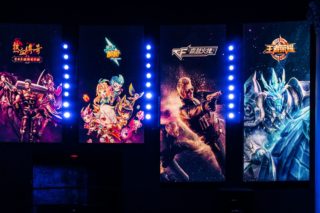Chinese media and entertainment conglomerate Tencent is looking to broaden its stateside reach and brand narrative by partnering with the Discovery Channel for a documentary covering the world’s largest mobile gaming developer’s history and culture in gaming.
Game Vision will dive deep into the role games have played in history, investigate the current state of gaming across applications and explore the opportunities tech presents for the future. The documentary will air in July on the American basic cable and satellite TV channel. It was produced in partnership with Tencent Interactive Entertainment Group.

“Discovery Channel reached out and presented us a program that was a good content vehicle and promotion for traditional gaming in the US market,” Mars Hou, vice general manager of marketing for Tencent Interactive Entertainment, told AListDaily. “It’s a very important vertical for us to protect our tradition with the documentary and share our commentary on the growing gaming market. They have great experience from the storytelling side, and it will be great to take advantage of their platform. I think they’ll do a great job in presenting the Chinese gaming culture—from FPS to mobile—and sharing the Tencent brand story at the same time.”
Hou said the finished product will offer a comprehensive look at how gaming impacts the daily lives of consumers, and how it will continue to change the way they live and interact with the world and with technology, from virtual reality, to real life.
“Tencent is one of the leading companies in China, but we’re always looking at new growth areas in other markets in the US, Europe and other countries, too. We want to know [the 180.5 million] US gamers and their backgrounds, cultures and lifestyles a lot better,” Hou said. “It’s important for us know what they want. It will help identify what they’re looking for so that we can align it with our announcements and marketing for further success.”
Tencent has investments and holdings in industry megaliths as Riot Games, Supercell, Glu Mobile, Pocket Gems and CJ Games, makers of such titles like Call of Duty, World of Warcraft, League of Legends, Overwatch and Candy Crush. Already sitting comfortably at the epicenter of the global games market share and capturing more than 25 percent of China’s mobile app usage through WeChat, Tencent wants to get a better understanding of North American consumers, too.

The video game market reached a total of $109 billion in 2016, according to Newzoo’s latest report, and per usual, the Asia-Pacific region represents the largest gaming segment—earning nearly half (47 percent) of all global game revenues. North America is the second-largest region in the video game market, taking a 25 percent share of the market to earn $27 billion this year.
Tencent also dispatched their executives to E3 last week in Los Angeles to meet with other companies and carry on discussions that will shape the future of the games industry—especially in the burgeoning verticals of augmented and virtual reality.
“There are still big challenges to make VR more popular to the common gamer. It’s not very easy,” Hou said. “We must care about the user, and how to make the process easier.”
One area of growth the fourth largest internet company by revenue behind Facebook, Alphabet (Google’s parent company) and Amazon is also positioning themselves in is esports. Tencent has detailed a $14.6 billion investment over five years in which they’d create new leagues, tournaments, associations and esports-themed industrial parks in China.
“Our strategy is different from that of other companies because we are both developers and publishers of PC and mobile games and have access to big gamer communities. We give consumers a complete experience with access to all kinds of games,” said Hou. “A lot of mobile gaming companies from countries from around the world are getting into and marketing strong for the Chinese, Korean and Japanese markets. There are big-time players with esports and gaming communities in these countries. Publishers are taking advantage with paid-and-subscription services. It’s great for the development of mobile games. It’s a very important part of Tencent’s business.”
Follow Manouk Akopyan on Twitter @Manouk_Akopyan

